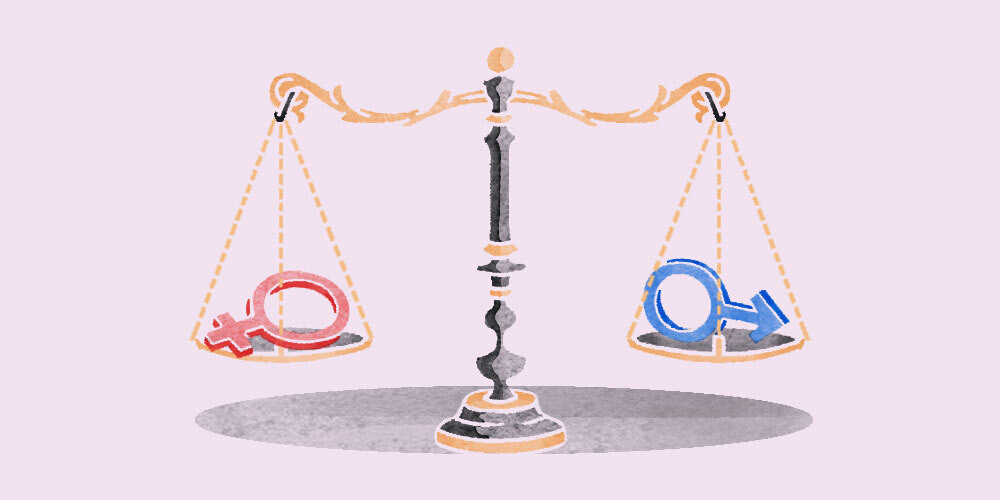‘I’ll interrupt them back’: Micro-feminism is taking off in the workplace

A new trend has emerged on TikTok where women are engaging in small acts of feminism, or “micro-feminism,” as they’ve coined it, at work.
Videos under the tag have upwards of 10 million views collectively, with creators across the world sharing their own experiences. Ashley Chaney helped start the trend with her original clip others have been stitching, and says her favorite form of micro feminism is simply addressing women first in a group email, like opening with “Hello Kathy, and Joe.”
“It’s like little acts that make men pissed off,” TikTok creator and attorney Katie Wood says in a clip she posted. For Wood, when someone is asking an unnamed leader or executive a question, she often says “let me know what she says.” She also likes to always address women as Ms. rather than Miss or Mrs.
Ultimately, the trend is about all the small changes people can make, particularly in the workplace, to fight gender inequality. While women certainly have made strides in the workplace in recent decades, they still earned about 82 cents for every dollar earned by men in 2022, according to the Pew Research Center. And women represent roughly one in four C-suite executive leaders, while women of color just one in 16, according to data from Mckinsey.
But more subtle behaviors contributing to these disparities are driving the discussion online. “I do participate in a lot of micro feminisms at work,” creator Ella Lowgren said in her video.
“I find in general at work that I’m not interrupted by women in meetings but I am interrupted by men. So if I’m interrupted by men I’ll interrupt them back, but I’ll never interrupt another woman when she is speaking,” Lowgren said.
And when she’s interrupted by a man, she’ll often continue talking over him until it’s so uncomfortable that he stops talking, she said. She’ll also go out of her way to ask male staff to handle more administrative tasks like booking and sending invites for a follow-up meeting, and sending meeting notes.
The trend is important because it speaks to the fact that people often don’t even recognize the assumptions they make, said Christy Pruitt-Haynes, distinguished faculty for leadership and performance at the Neuroleadership Institute.
“A perfect example would be if someone says, we need to get the opinion of the CEO, then most people will default and say yes, let’s see what he thinks. But if they were to say we need to get our receptionist to take care of this then most people will default and say oh yes let’s reach out to her,” Pruitt-Haynes said.
“Those are some just basic assumptions that play into larger decisions. Subconsciously, we think leaders are men and those in the more administrative positions are women. But those aren’t just assumptions we make because those same assumptions affect our decision making, they affect who we think to put on teams and who we think to promote.”
“The goal is to have conversations about the assumptions, and the biases that each of us have, so we can then start moving towards mitigating them,” she said.
While women are taking matters into their own hands online, organizations can have an influence on assumptions by promoting more gender inclusive language, she said. Some examples include changing the title of chairman to chairperson, and saying parental leave rather than maternity leave.
Diversity, equity and inclusion initiatives are under scrutiny now following the U.S. Supreme Court’s ruling last year against affirmative action, but the issue around inclusivity in the workplace “isn’t going anywhere,” said David Rice, host of the podcast “People Managing People.”
“Anything that highlights the discrepancy or disparity between experiences is a good thing,” Rice said. “Inclusive language has done a lot for the workplace, and it’s going to continue.”
Jen Manly, a membership manager and adjunct instructor, shared her favorite act of micro-feminism in a clip — not getting out of the way when a man is walking down the street. She used to yield to oncoming men but doesn’t anymore and sometimes even walks right into them.
Her video received pushback though from Black women and those with disabilities who said they experience this too but not just with other men — it comes from white women too.
It taught Manly that “it’s one thing to share your experience, and it’s another thing to share your experience and then label it as feminism, which in and of itself must be intersectional,” she said.


